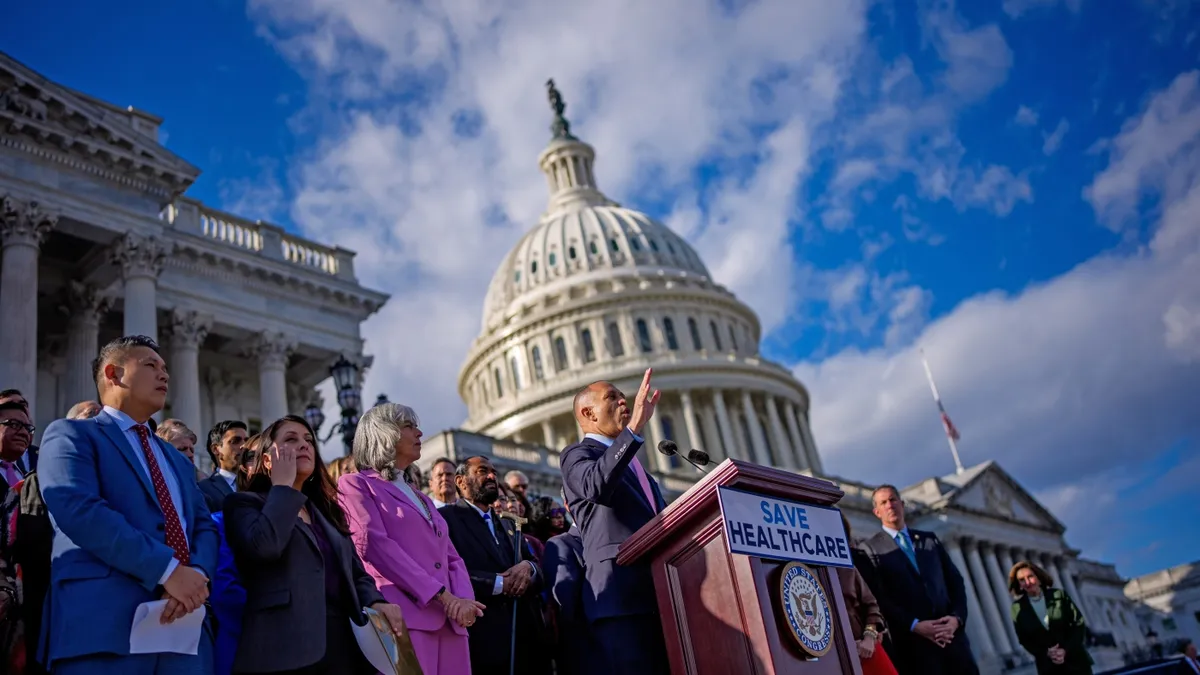
As the 2026 midterm elections approach, a recent NPR/PBS News/Marist poll reveals significant challenges for the Republican Party. Conducted between November 10-13, the survey of 1,443 adults highlights crucial indicators that may affect the political landscape. Notably, Democrats are enjoying their largest lead since 2017, with a 14-point advantage over Republicans in terms of voter preference for the upcoming elections.
One of the most concerning findings for Republicans is President Trump's approval rating, which currently sits at just 39%. This represents his lowest approval level since the events of January 6, 2021. The poll further indicates that a combined 60% of respondents hold congressional Republicans or Trump accountable for the recent government shutdown. Such discontent could severely impact Republican voter turnout in the midterms.
In a reflection of the prevailing economic concerns, nearly 60% of those surveyed believe that Trump should prioritize lowering prices, particularly regarding rent and food. Nicole Stokes, a participant from Dallas, Texas, expressed frustration over escalating living costs, stating, “It’s our pockets that are getting ripped apart to fund things.”
The poll also reveals a deep-seated disillusionment among voters towards major political institutions. Many respondents, including Wayne Dowdy from Memphis, Tennessee, indicate a lack of confidence in both parties, Congress, and the media. Dowdy, a self-identified lapsed Democrat, mentioned feeling “lost” and unseen by the Democratic Party. This sentiment highlights a broader trend of voter dissatisfaction as the country heads into the holiday season.
Interestingly, the Democratic Party has made significant strides in recent electoral contests, leading Republicans by 55%-41% on the congressional ballot. This marks the largest Democratic advantage in this measurement since November 2017, coinciding with a similar point in Trump's first term. Historically, a substantial lead on the congressional ballot has been a predictor of Democratic success in midterms. For instance, back in 2018, Democrats secured 40 House seats after holding a comparable lead.
The current sentiment among independents is also noteworthy, as they favor Democrats by a staggering 33-point margin. This marks a dramatic shift from the previous year when the two parties were evenly matched. The changing dynamics suggest that Democrats may have the momentum needed to capitalize on their current lead.
However, it is essential to consider the complexities introduced by redistricting. The number of competitive seats has decreased significantly, making substantial gains more challenging for either party. Trump has encouraged efforts to create more Republican districts in red states, while Democrats have reacted accordingly. Consequently, the path to control of the House remains uncertain as we look ahead to the 2026 elections.
Trump's declining popularity is a critical factor contributing to the Democratic advantage. With just 24% approval among independents and nearly 48% of respondents strongly disapproving of his performance, his unpopularity poses a significant threat to Republican candidates. Issues such as economic management and immigration policies have also been detrimental to his standing.
Despite these challenges, Trump's base remains loyal, with 90% of Republicans still approving of his performance. However, many Trump supporters, like Stokes, express frustration with Congress and feel disconnected from their representatives. “I don’t see anyone in the House or Senate who truly represents the American people,” she noted.
The poll indicates a broader trend of low confidence across various political institutions. While only 61% of respondents expressed confidence in the presidency, Congress received an alarming 80% rating of little to no confidence. The media, the Democratic Party, the Republican Party, and even the Supreme Court received similarly poor evaluations, suggesting a profound trust deficit across the board.
Interestingly, while 80% of Republicans maintain confidence in their party, only 57% of Democrats feel the same way about theirs. This disconnect indicates that Democrats may face challenges in rallying their base, even as they lead in current polls.
Political polarization remains high, with more than 80% of both parties perceiving the other as closed-minded. Additionally, a significant portion of independents views Republicans as more dishonest than Democrats. This pervasive lack of respect for opposing viewpoints contributes to the current political climate, complicating efforts for unity and cooperation.
As the nation prepares for the 2026 midterm elections, the data from the NPR/PBS News/Marist poll underscores the precarious position of Republicans. With shifting voter sentiments, economic concerns, and deepening political divides, both parties must navigate a complex and ever-evolving landscape.